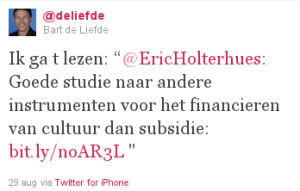
Arts organisations are subsidy-addicted and so we withdraw subsidies. The approach of the VVD is clear. On the exact how, they appear to need to think longer about that, now that there is so much opposition from the country. Cold Turkey, the treatment proposed by tolerance partner (nice word in this context) PVV could well result in deaths.
To see if anything else is possible, State Secretary Halbe Zijlstra commission an enquiry. Entirely in line with the cabinet policy of only looking at whether the measure was needed after the fact, he left it unsuspected research firm SEO, which is affiliated with the University of Amsterdam, examining whether the arts could actually do without subsidies.
The research had a striking conclusion: subsidy is not at all crazy as a basis for socially profitable arts funding. The agency added that there is also an important task for the government in making the sector more entrepreneurial.
VVD MP De Liefde revealed this week via twitter know that he finds the study interesting, and will definitely read it. This is good news and hopefully he will also read past the word subsidy-dependent.
So we just read along.
SEO researchers note that the cultural sector is indeed very subsidy-dependent. But that is quite different from the word 'subsidy addicted' used by the VVD, which was also recently used by the much less impartial columnist Pim van Klink still in NRC Handelsblad was called. SEO shows that much of the subsidy dependency is down to the government, so it should also help eliminate it. There is a mismatch between the cultural sector and business and there are major barriers to monetisation. Only the government can solve these obstacles.
One barrier is the so-called information skew. Business financiers do not understand the arts sector and the risks involved in making art, so they are reluctant to put money into it. Conversely, arts organisations do not understand what information a financier needs to be convinced of a project. So people happily talk past each other. One of the ways the government can help overcome this cold feet, writes SEO, is by providing a guarantee or by matching funds linking it to equity contributions. Or, by simply providing investors and institutions with coaching help. Establishing public-private funds could also help. Totally ideal is a combination like CultureInvest in Belgium, which is coaching and fund in one. There, it was found that one-third of investors were already helped by information and support.
There appear to be more obstacles to better cultural entrepreneurship. For instance, it is still quite difficult for art institutions to build up equity with which to pay for less profitable projects. Here, too, the government should actively intervene. On the one hand by perhaps even forcing institutions to build up equity, and on the other hand by helping them to do so. For instance, by making those same institutions more profitable by providing guarantees, in order to attract private investors.
But there is also something that the government could do better to leave out. The harsh language towards the sector, as well as the unwillingness to help the sector find new money, makes investors insecure. SEO writes:
"If the market doubts the consistency of government policy, it will factor in a risk premium for this and the attractiveness to private financiers drops."
You can guess that the same goes for using the word "subsidy addict". That's not exactly going to win over potential backers.
If the government really expects the sector to become more businesslike itself, it can help it with constructions that combine subsidies with other instruments that provide incentives for market-oriented thinking. Moreover, it will also have to help remove the barriers that are there now.
It is therefore good to hear from De Liefde that he is taking SEO's research seriously. Hopefully, he will also point out his state secretary again on his own research. After all, it shows that setting up a market-oriented art sector, as the VVD would like and which Zijlstra and de Liefde so often hammer away at, not only requires a lot of work from the sector itself, but especially from the government. And preferably in consultation.
Difficult word.
Click to access 2011-32_Cultuur_naar_vermogen.pdf


On subsidy dependence or addiction, I know a few more.
Let's start with politics. Paid entirely with taxpayers' money = subsidy.
Education. Pretty much 99.5% dependent on tax money = subsidy.
Healthcare. Annual budget overrun for years about 7%, despite compulsory insurance and co-payment. Delivers years of life satisfaction, at best. Goes into a lot of money.
The banks. Merrily subsidised by billions. Deals with very large amounts of money.
Road construction. Running entirely on taxpayers' money. It may not be called subsidy, but in the meantime.
At the municipal level: the parks department. Delivers beauty. At least at best. But doesn't yield a penny. Deals with a lot of money, though.
Ever seen a cultural company go bankrupt? Well in business, the so-called hard economic side. And who pays for such bankruptcy? Right, society, i.e. us, collectively.
That way, you could put everyone in the corner of suspicion. We did not do that so far in our society. Matter of civilisation.
Would have been highly advisable to have eea read by a business economist oid first.
Hi Rik: should you have any interesting observations from a business perspective, please share them with us. We will all benefit. So should you have time:feel invited.
Comments are closed.